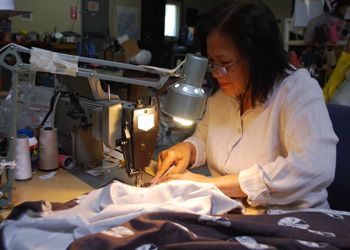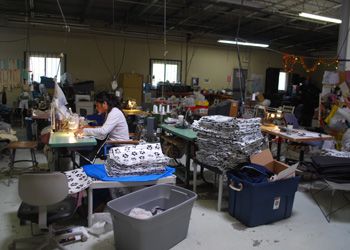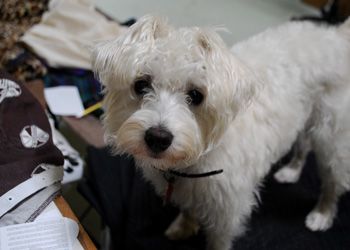Medical garment maker finds partner in Scarborough
Patricia Royall says she looked all over the state to find a sewing manufacturer for her new line of hospital johnnies made of tencel, a fabric derived from the bark of eucalyptus trees. But her search was harder than she expected. Despite Maine's storied history of textile manufacturing, Royall found that there are just a few facilities left here that can fill garment orders.
Royall has been building up her eco-friendly hospital-wear business, Jazzy Johnnys, since 2008. She first reached out to a company in Skowhegan to sew her designs, and when that didn't work out, she considered a business in Fall River, Mass. She also heard of another company in Eastport, but wanted something closer to her base in Richmond, she says.
Then, through word of mouth, she discovered a small, under-the-radar company called Golden Thread Designs in Scarborough. Golden Threads, as Royall refers to it, is a family-owned business founded by Bamphoth Am, a Cambodian woman who goes by "Aunt Ming."
Last Friday, Royall asked Golden Threads to make 250 johnnies she'll need for sales and prospective orders from local medical facilities. Her high-end johnnies look like bathrobes and nightgowns, and the tencel fabric they're made from is temperature-regulating, skin-sensitive, anti-bacterial and absorbent, according to Royall.
After investing "a good $175,000" into her company, Royall says she's just beginning to market her products. Though there's competition from other designers who want to redesign the johnny as well, she thinks her product has advantages, including Golden Threads. "They are proud of their work," she says of the Am family. "And they're proud people. Their work is beautiful, they do very high-end finished work, their prices are reasonable and they're close to me.
"And they're easy to work with, that is a very important thing, that relationship," she adds.
Golden Threads has a low profile, with almost no web presence, and it's tucked away in an industrial park on Commercial Road. A small sign, "Golden Threads, sewing contractor," hangs on the facility's white metal door. The warehouse within is gargantuan, filled with spools of fabric, hangers, plastic-wrapped clothing and old cloth mannequins. On a recent morning, two men and two women were working at sewing machines while occasionally glancing at the televisions in front of them. A little white terrier named Sony was sleeping on a pink dog bed on the floor, and a large fish tank displayed gleaming orange fish.
Aunt Ming, in glasses and a comfortable blouse, greeted Royall with an energetic hello and gave her a hug. After introductions were made, Ming explained that she left Cambodia in 1981 and started her company in 1989 in South Portland. She moved to her current facility 15 years ago. She offers stitching, cutting, sewing, packaging and design services, and works with her sister, niece, husband, 30-year-old daughter and 27-year-old son. The company makes about $100,000 to $120,000 a year, she says. A shirt designer from Maine and Royall are her biggest customers.
"We make almost everything," Ming says. "We make clothes, dog mats [for veterinarians], place mats, dresses. A little of this, a little of that."
Ming says she doesn't advertise and that all her orders arrive via word of mouth. Royall says this low-key approach to marketing might make it hard for prospective clients to discover the company. "Maine gave up a lot of its manufacturing, and I think there is a great opportunity for Golden Threads and other companies to go out there and market their services," Royall says. "I'm sure there are others looking to sew their garments here and instead are going over to China."
Royall has worked in nonprofit administration and has owned two art galleries in Brunswick and Richmond, but was inspired to start Jazzy Johnnys in 2008 after surviving breast cancer. The johnnies have a high price tag: almost $90. Though the johnnies are now made in Maine, the tencel fiber is purchased in Asia and woven into fabric in Taiwan, which racks up additional shipping and duties for the company. Royall says she wishes she could also find a local manufacturer to turn the fiber into fabric.
Though it's expensive to make her products, Royall points out that cotton, a cheaper alternative, is often farmed with pesticides. "People are not being harmed and the earth is not being harmed," she says of her product.













Comments